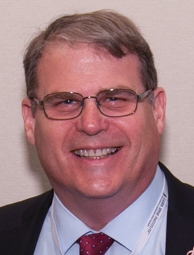Q: What do you think is the best way that surgery centers can remain competitive in the changing field of healthcare?
Sign up for our FREE E-Weekly for more coverage like this sent to your inbox!
 Janice Stewart, RN BSN, Nurse Administrator of Surgcenter of Bel Air
Janice Stewart, RN BSN, Nurse Administrator of Surgcenter of Bel Air
Surgery centers need to continue to keep costs down, but at the same time provide excellent service. Excellent service includes rigorous price negotiations with vendors, standardization across physicians, education of staff about being conscientious with supplies, offering great customer service and low to no infection rates.
Many patients love coming to the surgery center because it is so much easier. They are in and out faster, they have personalized, friendly service. The physicians like to come to the surgery center because turnover times are shorter and the staff are friendly and helpful. Also the infection rates for surgery centers are typically lower than the hospitals. The equipment is cared for more judiciously and while surgery centers cannot typically afford all of the latest and greatest equipment, the staff are aware of how to care for and use what we do have.
 Monica M. Ziegler, MSN, CASC, Administrator, Physicians Surgical Center (Lebanon, Pa.) & Center for Specialized Surgery (Bethlehem, Pa.).
Monica M. Ziegler, MSN, CASC, Administrator, Physicians Surgical Center (Lebanon, Pa.) & Center for Specialized Surgery (Bethlehem, Pa.).
Creativity, staff, efficiency and quality care. There is an opportunity for improvement around every corner and you need to be able to find or see it. This could be a new provider or a new process or a less costly supply. It could be a new trash collector or a new type of IV catheter.
Our staff are our assets and quality staff equals quality care. It's hard to meet goals of efficiency in process and costs if you do not have staff committed to the goal. There is nothing like: a surgery tech who is able to recognize which supplies to open and those to hold; an OR nurse who is empowered to make changes on preference cards so excess supplies are removed; the preop nurse that can admit a cataract patient in seven minutes effortlessly and have the patient feel valued and satisfied; the PACU nurse who can handle the flow of a busy pain day; or the receptionist with a sincere smile on her face and in her voice ; and a billing/collection team that are committed to meet the goals of 24 hour billing and A/R in less than 30 days.
Communication of the goal of efficiency is one of the most effective ways to engage staff in the process. We have started a "huddle" in the morning with the OR team to strategize who is where, when and why. It is a great way to keep all informed and valued in the process.
If we do not have quality care, we have nothing. Quality should be the building block of every ASC. Everything we do supports quality outcomes. Most recently I witnessed a new class of medical students don their "white coats" and recite the Hippocratic Oath. All of us in healthcare are committed to serve to the best of our abilities. That's what we are about.
 Bruce Kupper, CEO of MEDARVA Healthcare, Stony Point Surgery Center (Richmond, Va.).
Bruce Kupper, CEO of MEDARVA Healthcare, Stony Point Surgery Center (Richmond, Va.).
Provide the highest value possible to patients, surgeons and insurance companies. As the hospitals fight over control, ASCs should continue to emphasize value – high quality care and high quality service and low infection rates and great outcomes at a reasonable cost. This will allow ASCs to effectively compete. Furthermore, be responsive to the surgeons – hospitals tend to view surgeons as expense centers. A surgeon's request for new instrumentation or technology often has to compete with housekeeping's request for a new floor machine or radiology's request for a new CT scanner. View surgeons as an investment opportunity, and more importantly, move quickly to meet their needs.
Lynn Winter, RN, BSN, Administrator, Surgical Center of St. Louis (Bridgeton, Mo).
I believe we need to keep what we are doing but need to do more public relations. ASCs are proud of what they offer and I believe it is time we advertise to the public. We maintain low cost, high quality, low infection rates and high patient satisfaction in addition to being very convenient for patients and physicians. The lower cost alone will catch the public's eye. We have much lower overhead in addition to lower fee schedules. They need to be informed regarding JCAHO, CMS and AAAHC surveys and what it means for a center to be accredited. Healthcare reform is designed to promote better health and to keep costs down. ASC utilization is a no brainer!
 Joseph Ollayos, Administrator, Tri-Cities Surgery Center (Geneva, Ill.).
Joseph Ollayos, Administrator, Tri-Cities Surgery Center (Geneva, Ill.).
Remaining competitive under PPACA: cost and quality. As accountable care organizations form and manage population health status, and as potentially millions of Americans join state Medicaid rolls, cost pressure is going to be ferocious, and nobody can perform selected procedures/services more cost effectively than ASCs. There is always a great story to tell about patient satisfaction, convenience, low infection rates and personalized service in the ASC setting.
Nate Garner, MHSM, MBA, Administrator, Sunrise Ambulatory Surgical Center (Lakeside, Ariz.).
Surgery centers must continue to be the lower-cost and more convenient alternative for surgical care over hospitals. As reimbursements drop, this will become more challenging and require the ability to operate with slimmer margins. However, as long as quality levels remain high in surgical centers and services are less costly for patients and insurance companies, surgery centers should remain a key strategic force in the changing healthcare landscape.
Ginny Pecora, RN, Administrator of Oregon Eye Surgery Center (Eugene).
We should continue to remain independent, efficient and focus on what we do best.
 Jennifer Butterfield, RN, MBA, CNOR, Administrator, Lakes Surgery Center (West Bloomfield, Mich.).
Jennifer Butterfield, RN, MBA, CNOR, Administrator, Lakes Surgery Center (West Bloomfield, Mich.).
Remaining competitive means you need to be better than the hospital or better than the surgery center down the street. Find the talent. If you have talented physicians and staff members then it's going to be a lot easier to be the best. All patients, physicians and employees still want to be at/work at the best facility. It's like a race car. The fastest car wins the race, right? So what do you need in your engine to make it the fastest? High tech components, top notch oil, good air flow. You warm it up, you cool it down so the engine doesn't blow (Yes, this is Detroit, so you get the car reference!).
If you think of your surgery center as a formula one racecar, then you know it takes a lot of effort to make it the fastest and to keep it the fastest. Invest in new technology, invest in your organization, please your talent, please your patient — that's what will keep you from losing the race.
More Articles on ASC Issues:
6 Steps to Structuring ASC Administrator & Staff Bonus Programs
4 Proven Tips to Maximize Reimbursement in Surgery Centers
6 Philosophies for Resilient Ambulatory Surgery Center

